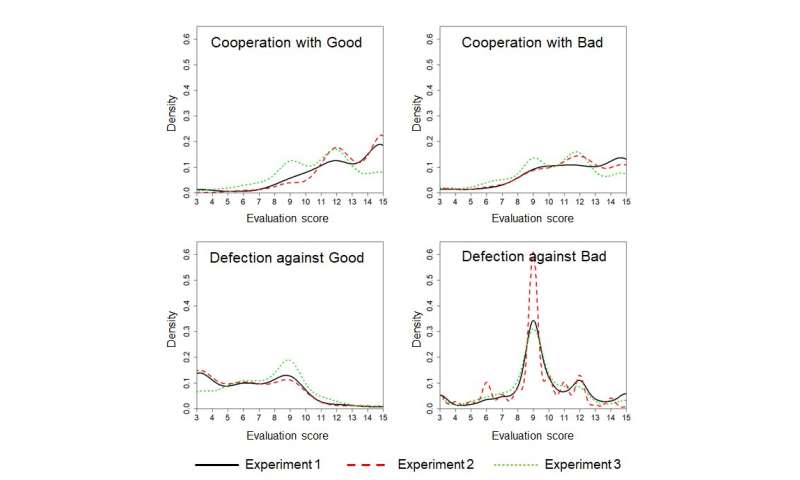#Is not helping a bad person good or bad?
“#Is not helping a bad person good or bad?”

A research team led by Hitoshi Yamamoto from Rissho University has analyzed how the social norm of indirect reciprocity is adopted in human society and revealed results that contradict previous theoretical predictions. The study was carried out in collaboration with colleagues Takahisa Suzuki (Tsuda University) and Ryohei Umetani (Rissho University), and its results were published in the open-access journal PLOS ONE on June 30, 2020.
People can engage in cooperative behavior even among strangers with no direct expectation of personal benefit. For such cooperative behavior to be sustained, a mechanism needs to be in place to ensure that benefits are returned to the individuals who cooperate. As the proverb goes, “One good turn deserves another.” This mechanism is generally referred to as indirect reciprocity.
Indirect reciprocity relies on social norms that distinguish the good from the bad. Many game theoretical studies have searched for norms that discourage cooperation directed toward the bad. Previous theoretical studies have predicted that the evaluation rule that “not cooperating with bad people is a good thing (justified defection)” is necessary to stabilize cooperative behavior. This is because if defection against a bad person is not justified, those who have not cooperated with an uncooperative person (a bad person) will be assessed as bad, thus a chain of non-cooperation emerges.
The research team conducted several online experiments to answer whether “justified defection” is justified and analyzed the norms that people adopt in their daily lives. The results show that, contrary to previous theoretical predictions, people have a neutral attitude toward justified defection, avoiding judging it as good or bad. On the other hand, they judged “cooperation with a bad person (unjustified cooperation)” to be good.
Yamamoto says, “Our results indicate the necessity to reconsider the justification of ‘justified defection’ in the evolution of cooperation.”
More information:
Yamamoto H, Suzuki T, Umetani R (2020) Justified defection is neither justified nor unjustified in indirect reciprocity. PLOS ONE 15(6): e0235137. doi.org/10.1371/journal.pone.0235137
Is not helping a bad person good or bad? (2020, July 1)
retrieved 1 July 2020
from https://phys.org/news/2020-07-bad-person-good.html
This document is subject to copyright. Apart from any fair dealing for the purpose of private study or research, no
part may be reproduced without the written permission. The content is provided for information purposes only.
If you want to read more Like this articles, you can visit our Science category.
if you want to watch Movies or Tv Shows go to Dizi.BuradaBiliyorum.Com for forums sites go to Forum.BuradaBiliyorum.Com




